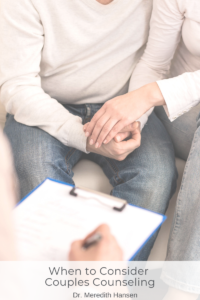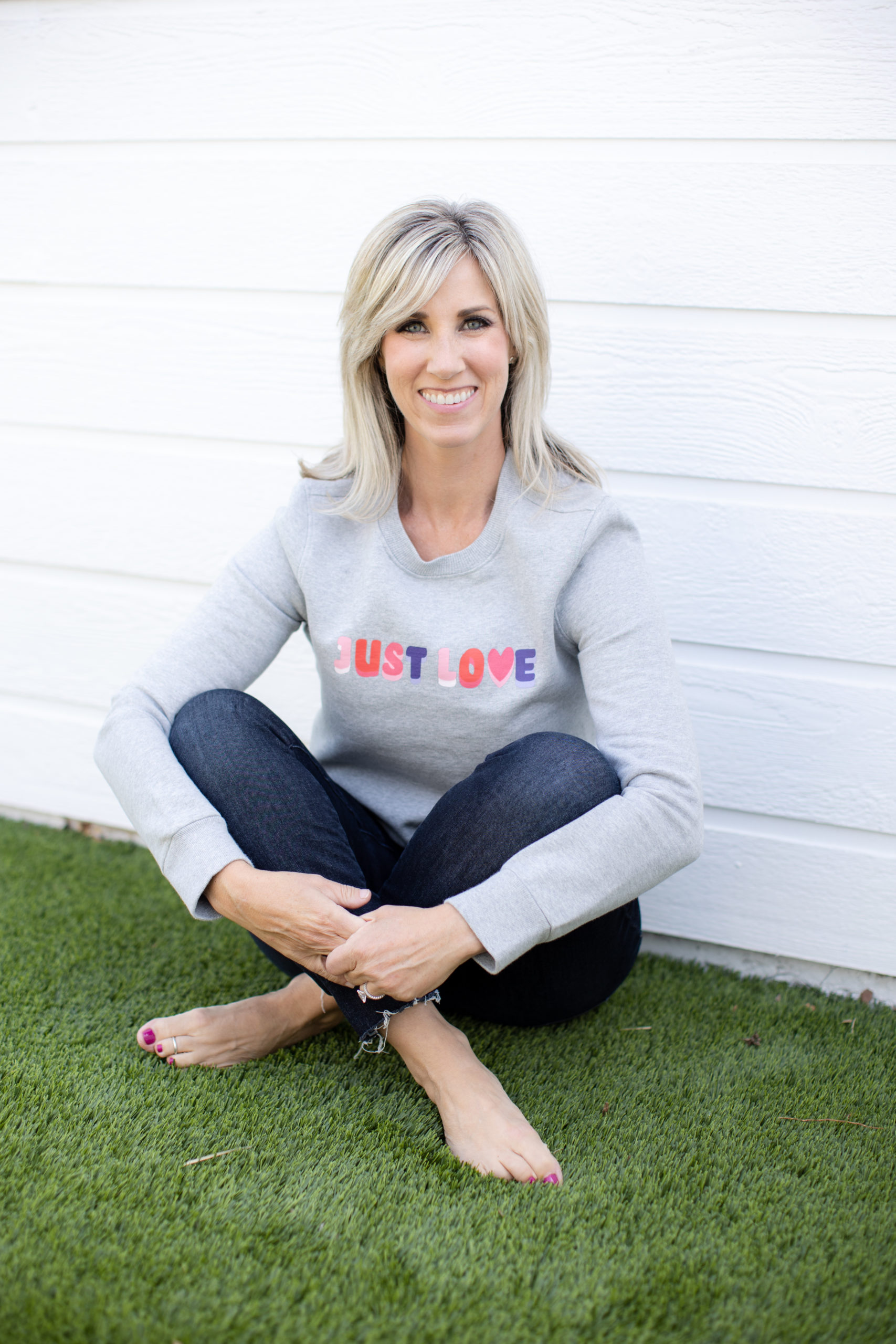
Do you have questions about couples counseling?
Have you ever wondered when to consider couples counseling?
The truth is that all couples need couples counseling.
Relationships are hard and every relationship, at one time or another, would benefit from and probably needs couples counseling. Whether the relationship is struggling because of a specific problem in time (i.e. new baby, recent betrayal, etc) or is breaking down due to unresolved conflict that has been swept under the rug through the years, all couples need counseling.
Unfortunately, most couples do not take the step they need to actually heal, repair, and grow together. Many couples believe that they can work through their problems on their own and hope that things will get better. In some rare instances, a couple can create change in their marriage by really focusing on their behaviors at home and working hard to be different, but for most couples, the patterns, pain, and problems persist.
As a couples therapist, I often see couples who too often wait until the “end” to try to make a change. What I mean by this is that the couple spends 10, 15, 20 years unhappy in their marriage, hoping things will get better and then decide when they are at their wits end to try counseling. While of course change can occur at this stage in a marriage, it is definitely more challenging and there are many more hurdles to overcome.
It’s the couples who realize early on that they need help that make the most progress. The couples who begin counseling during a life transition (i.e. getting married, having a baby, moving, job change) or the couples who begin counseling to tackle a persistent issue that is not getting better, such as in-laws, that end up the most satisfied over time.
So why is it that couples avoid couples therapy? What is the barrier for couples?
I truly believe that there are many reasons couples may avoid counseling. Some of them may include:
- Fear of the unknown. (“How does therapy work?”)
- Anxiety about drudging up the past. (“Will this just make us angrier with each other?”)
- Lack of time in the weekly family schedule. (“We’re just too busy to fit it in.”)
- The perceived cost of couples counseling. (“We can’t afford weekly sessions.”)
- Discomfort about opening up to a stranger. (“I don’t want to talk to a stranger about our problems.”)
- The belief that therapy isn’t helpful. (“How will sharing my feelings help our marriage?”)
- A bad experience with a past couple’s therapist. (“We’ve tried it before and it didn’t work.”)
- One partner isn’t willing to go. (“I want to seek help, but my spouse refuses to go.”) The list can truly go on and on. But at the end of the day, the reason isn’t important. There is and always will be a reason not to go. If a couple truly wants to repair and improve their marriage, they will find a way to get help. I have seen many busy couples without surplus funds who have found a way to commit to counseling. And often, that determination, motivation, commitment is the biggest predictor of success.
If you truly want your marriage to improve, if you want it to get better, it will. The mind is powerful and the impact of our own motivation is powerful. If a couple sits in front of me and is committed to making a change, the relationship improves. If on the other hand, one partner is uncertain, has one foot out the door, or has already met someone else, it is a lot harder to motivate towards change.
What Really Happens in Couples Counseling?
For those couples who are afraid of the unknown or doubt the process, let me shed a little light on it. Couples counseling is not what you see on TV. It isn’t repeating what your partner said, it isn’t somewhere you go to be told that you’re wrong, it isn’t even really a place to receive a lot of “relationship tools”.
Couples counseling is a place where a couple can learn about themselves, the relationship, and each other. It is a place where the “emotional trigger” beneath the fight about the dishwasher can be understood. A place where patterns in the couple’s “argument dance” become clear. Couples counseling is a place where the unique couple is seen for who they are and the pain and disappointments they have experienced can be acknowledged and repaired.
Now if that sounds too abstract or “touchy-feely” for you, I get it. Most couples don’t really understand the process until they’re fully in it. But at some point, the couples who want to make their marriage healthy again, are all in. They realize that talking each week in a different setting with their therapist’s support begins to shift the patterns. While it isn’t a direct path to happiness, in fact sometimes it has to get worse before it gets better, the motivated couples can and do repair. The couples who really want to be together and change put the time in, work hard, and the marriage improves.
What Does “Time and Work” Mean?
Really what “time and work” means is that couples who commit to meeting regularly (weekly or biweekly) and are open to the process (talking, reflecting, listening, trying new things) make progress. At the very base level, those couples are sending an indirect message to their spouse that they matter and that the relationship matters, which is powerful!
Then, when they arrive at session and begin to work through a problem or pattern something starts to shift. Over time they hear one another more clearly, the express themselves more directly, feelings are understood, empathy and compassion increase, criticisms decrease, joint goals are established, and life at home gets better and better.
It is a subtle process that brings a sense of relief, enjoyment, and happiness to couples who have felt disappointed, hurt, lost, and uncertain about their relationship.
How do we know if we need couples therapy?
As I mentioned above, I truly believe couples counseling is beneficial for all couples, but if you’re wondering if it’s time to get started, review the list below. Take some time to reflect on your own relationship and remember that it is always better to reach out and get an assessment and realize that you are on track then to wait 20 years and then discover life together could have been so much better.
10 Signs You Should Consider Couples Counseling:
- If there is there has been a life transition that is causing a lot of friction (new baby, new job, moving).
- If there is a perpetual problem that continues to surface and cause conflict (in-laws, roles at home, money).
- If you are starting to feel disconnected (spend less time together, time together is not as satisfying).
- If there has been a dramatic decline in intimacy (whether that is less overall physical connection or just a decrease in your sexual relationship).
- If resentment is turning into contempt (there is a growing disdain for your spouse).
- If you are not talking about the issues (sweeping issues under the rug out of fear of bringing things up).
- If talking about the issues feels like it makes life at home worse (problem-solving issues).
- If there are habits and patterns in the marriage you would like to change.
- If you feel like your marriage is negatively affecting your personal well-being, your children’s well-being, the overall well-being of the family.
- You have thought about it, talked about it, considered it, but never taken the step to set up the appointment.





